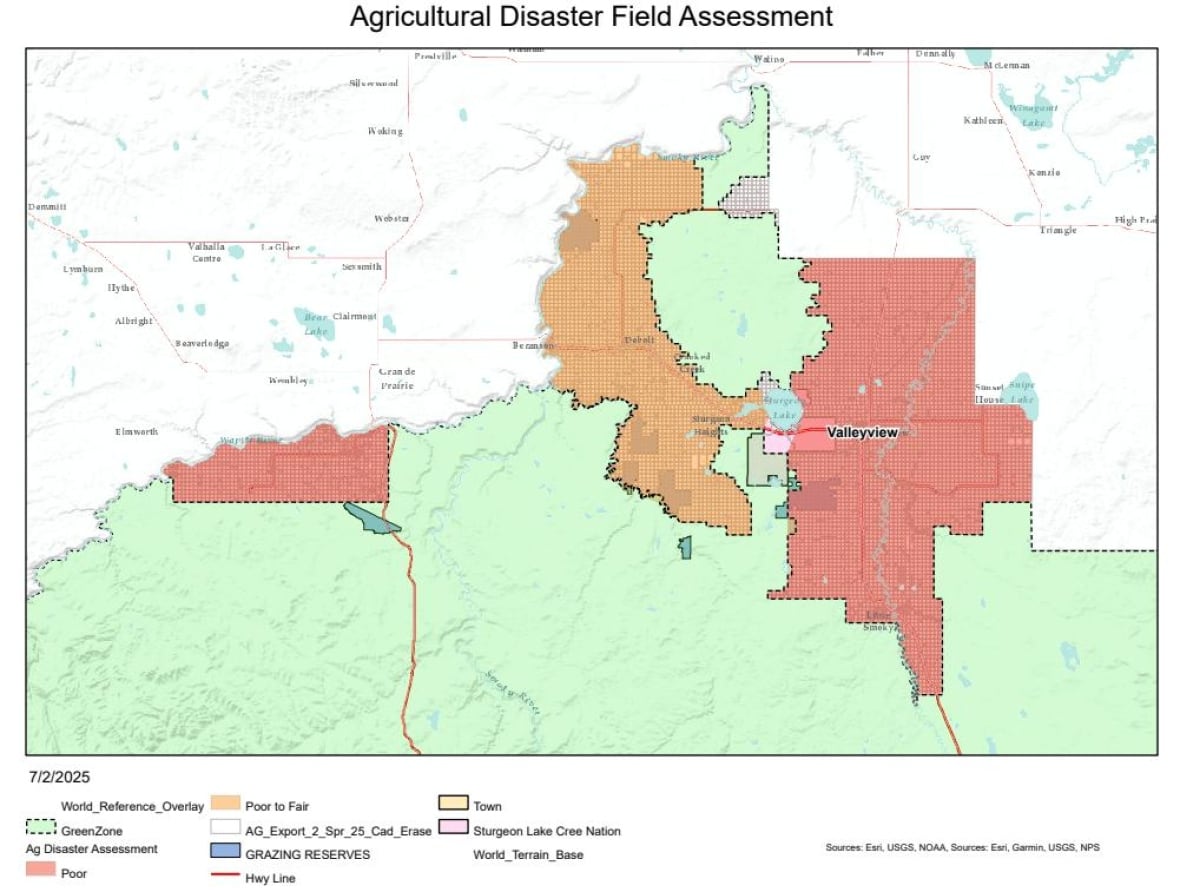[
Two rural municipalities in northwestern Alberta are sounding the alarm over extremely dry conditions that local officials say are threatening the livelihood of many cattle ranchers in the region.
On July 8, the Municipal District of Greenview, located about 400 kilometres northwest of Edmonton, declared a municipal agricultural disaster for its livestock industry.
With widespread dry weather persisting throughout the region, the neighbouring County of Grande Prairie also declared an agricultural disaster on Friday due to similar concerns for their livestock herds.
In a new release on Monday, the M.D. of Greenview stated that the decision was made because of unprecedented drought conditions and significant grasshopper infestations in the region, which are causing hay and pasture lands to fail.
Bill Smith, the deputy reeve for the M.D. of Greenview and a fourth-generation rancher, said he can’t remember a time when the region saw this many consecutive years of dry conditions.
“I’ve asked some of the old-timers that I know, and none of them say they’ve ever seen it this bad, because on top of how dry it is, it’s these grasshoppers that are just hammering us.”
The exceptional drought conditions are leaving ranchers concerned they won’t have enough hay to feed their livestock, said Smith.
“I should be getting 3,000 bales a year, and I’m probably going to hit 500 [bales this year]. Last year, there were about 1,000. This is about as severe as it’s gonna get for us.”
Smith said the dry conditions are being compounded by throngs of grasshoppers that are devouring any new plant growth in the area.
“Now, we have these grasshoppers, and they’re just flying right now, and they are like a combine going across the field. They’re just sucking up any quality [hay] that we have.”

Tyler Olsen, the reeve for the M.D. of Greenview, said he is very concerned that the local drought conditions will result in a serious lack of feed for the region’s cattle herds through the fall and winter. As a result, he said these conditions could force ranchers to preemptively liquidate their herds.
“There are producers that are looking at selling already. They just can’t make it through the fall with what they have,” said Olsen.
Olsen hopes that declaring this agricultural disaster will help bring awareness to some of the needs of the municipality’s livestock industry from both provincial and federal governments.
LISTEN | Drought conditions result in agricultural disaster being declared in the M.D. of Greenview
Radio ActiveDry conditions in have prompted one northern Alberta community to declare a state of agricultural disaster
Parts of the province have been dealing with extended periods of drought and that’s taking a toll on some agricultural industries. The municipal district of Greenview in northwest Alberta has declared a state of agricultural disaster for the region’s livestock producers. Tyler Olsen is the reeve of the district, and Bill Smith is the deputy reeve for the area, as well as a fourth generation rancher.
In an open letter to Alberta’s Agriculture Minister RJ Sigurdson, Olsen asked for the M.D. of Greenview to be included in the regions that are eligible for the federal livestock tax deferral program.
He also requested additional mental health support for farmers struggling with the worsening conditions for their livestock.
“It’s their livelihoods that are failing now, and that’s gonna be harsh for them. Their minds are part of the whole thing, and if we can’t protect those too, then it’s going to be even more detrimental.”
In a statement to CBC, the provincial Agricultural Ministry stated that it provides grants to multiple organizations that offer agriculture-specific mental health support for farmers.
The ministry also said the province is committed to continuing advocacy efforts at a federal level on behalf of livestock producers affected by extreme weather conditions. It said that as a result of this advocacy, more eligible regions in Alberta have been able to access federal financial support.
Smith said that many ranchers in the area may be forced to leave the livestock industry entirely due to the current difficult conditions.
“To face the fact that we might have to get rid of [our livestock] is just heartbreaking,” said Smith.